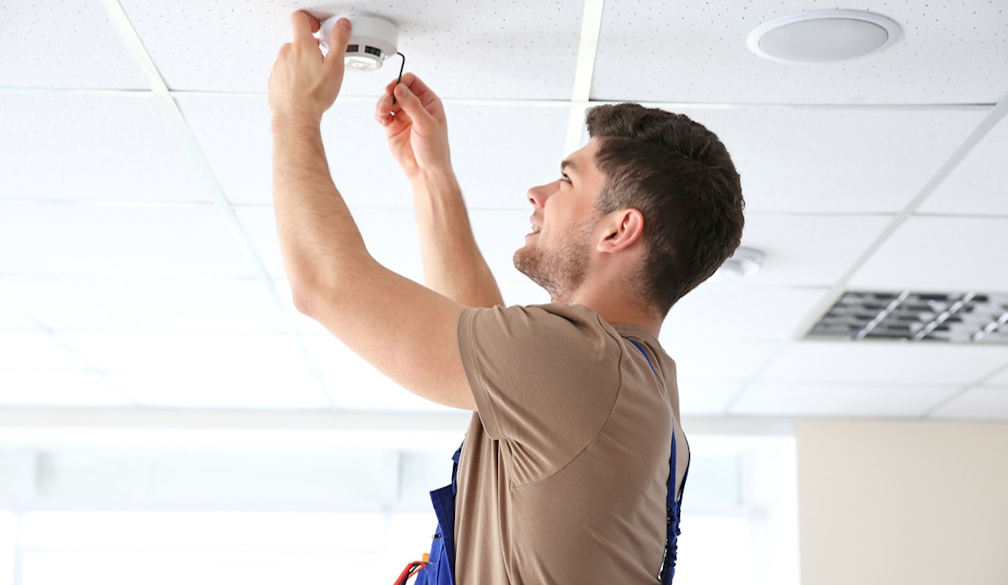How Often Should Smoke Alarms Be Replaced and Reinstalled?

Your smoke alarm might look fine hanging there on the ceiling, doing its silent job day after day. But here's the unsettling truth: it could still be putting you, your family and all your assets at serious risk, and you'd never know until it's too late.
That innocent-looking device has an expiry date, and when it passes, your home's first line of defence becomes about as useful as a chocolate teapot. Let's discuss everything you need to know about smoke alarm replacement and why that seemingly perfect alarm might be silently failing you.
The Hidden Danger of "Working" Smoke Alarms
Think your smoke alarm is fine because it's not beeping and the test button still makes noise? That's exactly what makes this so dangerous. Smoke alarms don't just suddenly stop working with a dramatic announcement. They slowly, quietly lose their ability to detect smoke, putting you in a vulnerable state when you least expect it.
Australian fire safety authorities are crystal clear: all smoke alarms must be replaced every 10 years, regardless of how well they seem to be working. And trust us, this isn't some arbitrary number dreamed up by safety officials. Australian Standards stipulate an operating life of 10 years, after which the alarm's sensitivity and functions can decline.
The sensors that detect smoke particles become less responsive over time. Dust accumulates in places you can't see. Electronic components simply wear out. Your alarm might still chirp when you press the test button, but when real smoke appears, it could be too sluggish to wake you in time.
Decoding Your Smoke Alarm's Warning Signs
Your smoke alarm communicates through beeps, and understanding this language could save your life. Each pattern means something different, and ignoring them is like dismissing your car's engine warning light.
The Single Chirp Pattern
If your smoke alarm emits a single high-pitched chirp every 30 seconds, it's usually signalling a low battery. But don't assume it's always that simple. Sealed battery models will also chirp every 30 seconds to signal that the entire unit needs replacement.
For those 10-year lithium battery units, that chirping might be your alarm's way of saying goodbye after a decade of faithful service.
Continuous Loud Beeping
Continuous beeping could indicate a real fire or a false alarm. Never assume it's false until you've thoroughly checked. Do note that harmless steam from showers or high humidity can trigger false alarms, particularly with older ionisation alarms.
Queensland homeowners know this challenge well, where humidity often exceeds 60% and can trick older alarms into detecting smoke where there's only moisture.
Multiple Beeps or Irregular Patterns
Different beep patterns can signal various problems. If you have a combination unit detecting both smoke and carbon monoxide, multiple beeps might indicate rising CO levels rather than smoke.
Irregular beeping often points to contamination issues. If the chirping isn't indicating power problems or low batteries, your alarm is likely contaminated with dust and needs attention.
When to Call a Professional Electrician for Smoke Alarm Replacement?
Not every smoke alarm problem can be solved with fresh batteries. Some warning signs demand smoke alarm installation of completely new units, preferably by qualified professionals.
The Age Factor
Check your alarm's manufacture date – it's usually printed on the back or side. Most quality alarms have date codes showing exactly when they were manufactured and their recommended replacement date.
If your alarm approaches or passes the 10-year mark, don't wait for problems to start.
Persistent Problems After Maintenance
If your alarm keeps beeping despite battery replacement and cleaning, the unit itself is probably failing. Sometimes obvious issues like forgetting to remove battery pull tabs cause problems, but persistent beeping usually indicates internal component failure.
It's no surprise that many Australian homes face challenges with dust and insects. Spiders frequently nest inside alarms, displacing batteries and contaminating sensors. If you're constantly battling false alarms or contamination, a complete replacement is the safest option.
What Australian Authorities Recommend?
Fire safety authorities across Australia consistently recommend going beyond minimum requirements for maximum protection.
Expert local electricians in Perth recommend installing smoke alarms in every bedroom and living area, not just meeting minimum legal requirements. For optimal protection, install interconnected systems where activating one alarm sounds all alarms throughout the property.
One important thing to consider, photoelectric alarms are strongly recommended by most fire authorities over ionisation types. They respond faster to smouldering fires typical in Australian homes and produce fewer false alarms.
Professional smoke alarm installation ensures proper placement, electrical connections, and compliance with current standards. It's not just about mounting a device to the ceiling – proper installation requires an understanding of airflow patterns, electrical requirements, and interconnection systems, and thus, it's always a bright idea to consult with expert electricians to get the job done right.
State-Wise Smoke Alarm Requirements You Must Know
Each Australian state has specific legislation, but core principles remain consistent across jurisdictions. Here's a rundown of some of the best practices, but we'd advise you to consult with your local electrician to stay abreast with the latest changes in the regulations.
Residents of Perth and other parts of WA are required to replace all smoke alarms every 10 years.
NSW legislation mandates smoke alarms on every level of residential properties, including owner-occupied homes, rentals, and relocatable dwellings. Alarms must comply with Australian Standard AS3786.
Victoria requires mains-powered alarms with battery backup for homes built after August 1997. Older homes may use battery-powered units, but authorities recommend 10-year lithium battery models for reliability.
Queensland has particularly strict rental requirements. Landlords must test and clean alarms within 30 days before each tenancy, placing significant responsibility on property owners.
The Real Cost of Delay
Postponing smoke alarm replacement might seem economical, but it's actually one of the most expensive risks you can take. Fires can spread to an entire room within minutes, and just two breaths of thick smoke can render someone unconscious.
When seconds count, you need alarms that respond immediately, not ones operating at diminished capacity. Basic replacement alarms cost as little as $10-$50, while premium photoelectric models range up to $100. Even a comprehensive whole-house won't cost you a lot - negligible compared to fire damage costs or insurance excesses.
Take Action Now to Secure Your Home and Loved Ones
Your smoke alarms work around the clock protecting your family, but only if you maintain them properly.
Professional smoke alarm installation ensures your new system meets current Australian standards and provides maximum protection. Check manufacture dates, and if any alarms approach 10 years old, connect with reliable experts and start planning replacements immediately.





